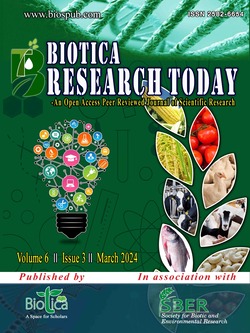
Application of Biotechnological Tools for Tropical Tuber Crop Improvement
B.G. Sangeetha*
Division of Crop Protection, ICAR-Central Tuber Crops Research Institute, Sreekariyam, Thiruvananthapuram, Kerala (605 017), India
E.R. Harish
Division of Crop Protection, ICAR-Central Tuber Crops Research Institute, Sreekariyam, Thiruvananthapuram, Kerala (605 017), India
R. Arutselvan
Division of Crop Protection, ICAR-Central Tuber Crops Research Institute, Sreekariyam, Thiruvananthapuram, Kerala (605 017), India
C. Pradeepika
Section of Crop Utilization, ICAR-Central Tuber Crops Research Institute, Sreekariyam, Thiruvananthapuram, Kerala (605 017), India
DOI: NIL
Keywords: Biotechnology, Food, Sweet potato, Tuber
Abstract
Tropical root and tuber crops serve as second main food crop after cereals. They are wealthy source of dietary fibres and play key role in the food security of global population. Cassava, sweet potato, yams, taro, tannia and minor tuber crops are the tropical tuber crops mainly cultivated in India. Despite of its agricultural importance most of the tropical tuber crops are not as much of exploited like other food crops. By various modern biotechnological approaches such as next generation sequencing (NGS) with the aid of various omics technologies the various novel traits of tuber crops can be identified. Application of plant biotechnology have already proven as promising technology for developing economically important plant varieties with novel traits even with interspecies crosses. Here we describe the past developments and modern approaches of plant biotechnology for the improvement of tropical tuber crops.
Downloads
not found
Reference
FAO, 2022. World Food and Agriculture - Statistical Yearbook 2022. In: FAO Statistical Yearbook - World Food and Agriculture. FAO, Rome, Italy. p. 382. DOI: https://doi.org/10.4060/cc2211en.
Lyons, J.B., Bredeson, J.V., Mansfeld, B.N., Bauchet, G.J., Berry, J., Boyher, A., Mueller, L.A., Rokhsar, D.S., Bart, R.S., 2022. Current status and impending progress for cassava structural genomics. Plant Molecular Biology 109, 177-191. DOI: https://doi.org/10.1007/s11103-020-01104-w.
Ntui, V.O., Tripathi, J.N., Kariuki, S.M., Tripathi, L., 2024. Cassava molecular genetics and genomics for enhanced resistance to diseases and pests. Molecular Plant Pathology 25(1), e13402, DOI: https://doi.org/10.1111/mpp.13402.
Yan, M., Nie, H., Wang, Y., Wang, X., Jarret, R., Zhao, J., Wang, H., Yang, J., 2022. Exploring and exploiting genetics and genomics for sweetpotato improvement: Status and perspectives. Plant Communications 3(5), 100332. DOI: https://doi.org/10.1016/j.xplc.2022.100332.
Yang, J., Moeinzadeh, M.H., Kuhl, H., Helmuth, J., Xiao, P., Haas, S., Liu, G., Zheng, J., Sun, Z., Fan, W., Deng, G., Wang, H., Hu, F., Zhao, S., Fernie, A.R., Boerno, S., Timmermann, B., Zhang, P., Vingron, M., 2017. Haplotype-resolved sweet potato genome traces back its hexaploidization history. Nature Plants 3, 696-703. DOI: https://doi.org/10.1038/s41477-017-0002-z.
